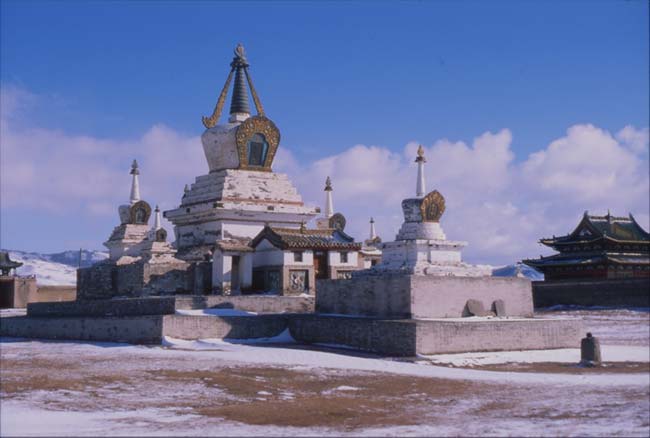[Sights & sounds from a 2001 Mongolian music recording expedition (![]() =
= ![]() ).]
).]
![]() "Jonon Khariin Yardal" Performed by Nergui Ashiid
"Jonon Khariin Yardal" Performed by Nergui Ashiid
("Step of the black horse") 12/01 Ulaan Baatar (3:06)
Baagii and I spend a few weeks in the countryside on horseback. I'm not a skilled rider but my horse is patient. Like most Mongolians, Baagii is a fine horseman, and gallops as if he and the animal were one. Falcons glide silently beside us as we pass through desolate landscapes and grand expanses of bare earth and sky. The melodies of the morin khoor seem to echo in the horizon. Signs of civilization are few and far between; there's something satisfying about being lost in places with no roads.

At the top of each mountain pass, Baagii stops to place rocks on an ovoo, a cairn honoring of the spirit of the pass. Blue silk scarves have also been left here as offerings to the sky. Before going to battle, Chinggis Khan would pray on a hilltop to the spirits of heaven. It was the sky that protected his armies as they rode through foreign territory.
Private land ownership does not exist in rural Mongolia, a philosophy that predates communism. The people out here are nomadic shepherds, migrating several times a year to new pastures. They graze their herds and collect dung for fuel. To me they don't seem too concerned with the modern world, until I notice some gers with solar panels and generators for radios. One family even has a satellite dish and television, which they move, along with the ger, by camel caravan.
![]() "Khoomi Holboo Ayalguu" Performed by Nergui Ashiid
"Khoomi Holboo Ayalguu" Performed by Nergui Ashiid
("Linked Melodies") 12/01 Ulaan Baatar (3:00)

We ride into a valley with a derelict Soviet factory and the neglected walls of the Erdene Zuu Monastery. We camp outside the town, but I can't sleep. Above us is an immense canopy of stars. Around us, a barren valley, once the city of Karakorum. This was the capital of Chinggis Khan's immense empire. Now you can't tell it ever existed.
The next afternoon we meet a father and son on horseback. We help them herd their yaks, and they invite us back to their ger. It never ceases to amaze me how the poorest people are often the most friendly and hospitable. They seem too humble to be the descendents of brutal warriors.
That night, an old woman with grand eyes offers us bowls of fermented horse milk. We dine on horsemeat, right off the bone. I don't know how I can look my own horse in the eye tomorrow. The husband's weathered face has hardened into a grin. He tells us he's happy to own his own herd. He thinks this winter's grazing will be difficult. The zuud, or blizzards, of recent years have killed millions of livestock. The old man says the zuud are caused by woodland spirits, angered by logging and industrial pollution.
Tomorrow he's going hunting for bear, but says he'll settle for marmot. Baagii licks his lips at the thought of roasted marmot. I'm not so sure. An outbreak of bubonic plague from an undercooked marmot has quarantined the nearby town of Tsetserleg. It's thought that the Mongols once introduced the black plague to Europe.
Still Baagii insists that marmot is a delicacy. I continue chewing my leg of horse, and realize I haven't seen a vegetable for weeks. The old man praises our horses and says it's good we're travelling this way, like Chinggis Khan, he winks.
He pours us each a bowl of paint-stripping vodka, and we make offerings with ring fingers dipped and flicked to the earth, wind, and sky. We drink, and then he challenges us each to arm wrestle. After a few humiliating rounds, I take out my guitar, and Baagii sings this song...
![]() Another horse song Performed by Baagii
Another horse song Performed by Baagii
with Jack Chance on guitar (2:45)
The lyrics tell of a great horse who was sold to foreigners. After years in exile, the horse begins to miss the smell of the steppe and one night escapes his stable. Losing his strength as he gallops across the desert, the wind in his mane carries him home. Mongolians have a lot of love songs; most are about horses.
In the year 1277, Chinggis Khan's body was carried to Burkhan Kaldun, a mountain in northeastern Mongolia, where as a youth he'd once escaped a vengeful tribe. Any unfortunate witnesses to this funeral procession were immediately killed, so that the grave's location remains, to this day, a secret.
Today Mongolia is a poor sparsely populated country, nearly forgotten between the dominating neighbour-giants of China and Russia. But Chinggis is very much alive. Although the empire has faded, the surname Khan is still common throughout central Asia, and every Mongolian knows his legend.
Baagi and I reach the city of Darkhan, and hitch our horses outside an internet café. Inside the young descendents of the Mongol warriors battle each other on computer games. While I email friends and catch up on news from the empire I call home, I remember that the Mongols once decimated Afghanistan and Iraq. Outside, on the wall of a crumbling Soviet building, I see English graffiti. It reads "horseman." The window panes have been painted blue, a bright shade, like the sky.

![]() "Sankhu Golom" Performed by Narangerel Buyanjargal
"Sankhu Golom" Performed by Narangerel Buyanjargal
("Horse Song") Instrument: Yattag, 10/01 Ulaan Baatar (3:38)
audio/text/photos © 2001 Jack Chance
Chance's recordings will soon be available on the new CD:
Greetings from Elsewhere: An Asian Music Sampler